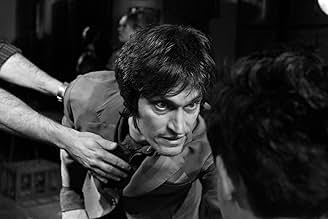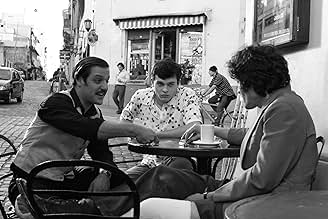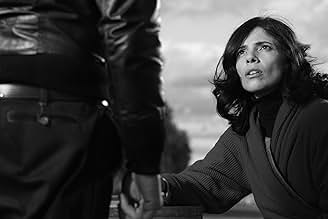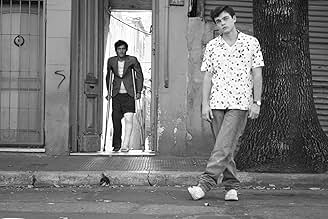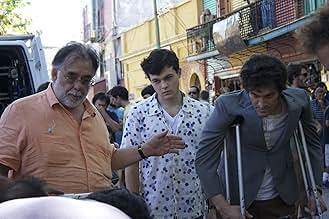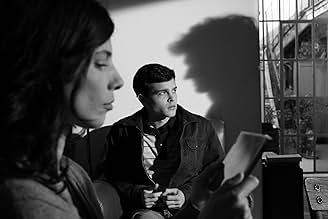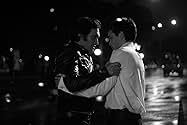Tetro
- 2009
- Tous publics
- 2h 7m
IMDb RATING
6.8/10
14K
YOUR RATING
Bennie travels to Buenos Aires to find his long-missing older brother, a once-promising writer who is now a remnant of his former self. Bennie's discovery of his brother's near-finished play... Read allBennie travels to Buenos Aires to find his long-missing older brother, a once-promising writer who is now a remnant of his former self. Bennie's discovery of his brother's near-finished play might hold the answer to understanding their shared past and renewing their bond.Bennie travels to Buenos Aires to find his long-missing older brother, a once-promising writer who is now a remnant of his former self. Bennie's discovery of his brother's near-finished play might hold the answer to understanding their shared past and renewing their bond.
- Director
- Writers
- Stars
- Awards
- 1 win & 6 nominations total
Rodrigo de la Serna
- José
- (as Rodrigo De La Serna)
Erica Rivas
- Ana
- (as Érica Rivas)
Sofía Gala Castiglione
- María Luisa
- (as Sofía Castiglione)
- Director
- Writers
- All cast & crew
- Production, box office & more at IMDbPro
Featured reviews
After a career that has consisted of the "Godfather" movies, "Apocalypse Now", "The Outsiders", Bram Stoker's "Dracula" and "Youth without Youth" - to name just a few - where would Francis Ford Coppola go next? He directed "Tetro", about the secret history of an Italian-Argentinian family.
Benjamin Tetrocini (Alden Ehrenreich) arrives in Buenos Aires and goes to visit his brother Angelo (Vincent Gallo). The embittered Angelo is now going by the name Tetro. As the movie progresses, a series of important topics about the family gets revealed, and how it has always affected the relationship between the two brothers.
Coppola uses one of the most unusual devices to tell the story. The present is filmed in stark black-and-white, while the past is shown in a slightly grainy color. It's as if the past was supposedly apparent - to show that the characters thought that they knew everything that was going on - while the present is supposedly unclear (to show that there are things to be discovered). I read that the movie pays homage to "The Tales of Hoffman", but I don't know that one, so I have to take the movie at face value. And what I saw certainly impressed me. I definitely recommend this movie.
Also starring Maribel Verdú, Carmen Maura, Klaus Maria Brandauer, and Rodrigo de la Serna (who co-starred in "The Motorcycle Diaries" and is a relative of Che Guevara).
Benjamin Tetrocini (Alden Ehrenreich) arrives in Buenos Aires and goes to visit his brother Angelo (Vincent Gallo). The embittered Angelo is now going by the name Tetro. As the movie progresses, a series of important topics about the family gets revealed, and how it has always affected the relationship between the two brothers.
Coppola uses one of the most unusual devices to tell the story. The present is filmed in stark black-and-white, while the past is shown in a slightly grainy color. It's as if the past was supposedly apparent - to show that the characters thought that they knew everything that was going on - while the present is supposedly unclear (to show that there are things to be discovered). I read that the movie pays homage to "The Tales of Hoffman", but I don't know that one, so I have to take the movie at face value. And what I saw certainly impressed me. I definitely recommend this movie.
Also starring Maribel Verdú, Carmen Maura, Klaus Maria Brandauer, and Rodrigo de la Serna (who co-starred in "The Motorcycle Diaries" and is a relative of Che Guevara).
The week of his 18th birthday , Bennie (Alden Ehrenreich fim debut) travels to Buenos Aires to find his long-missing older brother . As he seeks out his older brother, the washed-out and disturbed Tetro (George Gallo) , whom he hasn't seen in years. Tetro lives with Miranda, (Maribel Verdú) a happy and always glad woman . He's introducing him as a "friend," refusing Tetro to talk about their family and some thoughts of their nasty dad cast a shadow over both brothers . But every family has a secret and every family has a past . Along the way Bennie's discovery of his worn-out brother's near-finished play might hold the answer to understanding their shared past and renewing their bond .
This an unsettling and interesting film , an intense drama concerning what past has Tetro left behind , being full of emotion , touching scenes , good feeling , marvellous dances inspired by The Hoffman Tales , The Red shoes by Michael Powell/ Emeric Pressburger and a final twist . It is a simple , dramatic and intelligent portrait of two people , focused on brothership , and sibling rivalry which a dark secret will forever change the family's fate . This is an uplifting movie at times , too , not just a tear-jerker or horrific in showing two sibling's suffering , as they attempt to regain the dignity they lost after years spent without seeing . The picture is developed in slow-moving but is pretty well realized . The flick stands out for its melancholy and poignant multilevel exploration of alienation , past records and despair . The story has a certain melancholic style , a climate of transience and sadness that spread the dispute between the two protagonists brothers . Visually it transports one into a dark, grey , nightmarish world but enriched by some colorful images thanks to some flasblacks well photographed by Mihai Malaimare Jr. , these images were shot in colour , but treated to give a slightly faded texture. The screenplay by Coppola himself , acting, direction all come together to create this extraordinary viewing experience . George Gallo gives a nice acting as the burnt-out Tetro , once-promising writer who is now a remnant of his former self , and he is is hot and cold toward his brother . His sibling is finely played by Alden Ehrenreich at his film debut as Bennie, a waiter on a cruise ship who has a layover in Buenos Aires to meet again his brother and subsequently he finds pages of Tetro's unfinished novel, then he pushes both to know his own history and to become a part of his life . Support cast is pretty good with several Argentina/Spain actors such as Maribel Verdú , Carmen Maura , Rodrigo De la Serna , Silvia Pérez , Erica Rivas , Leticia Brédice and special mention for Klaus Maria Brandauer as father .
The motion picture was compellingly directed by Francis Ford Coppola , though far from his greatest successes . Coppola explained that this one was a very "personal" project , being the kind of film he set out to make as a young man, before he was sidetracked by fame , fortune and sucessful boxoffice. Coppola's film The Godfather (1972) became one of the highest-grossing movies in history and brought him an Oscar for writing the screenplay with Mario Puzo The film was a Best Picture Academy Award-winner, and also brought Coppola a Best Director Oscar nomination. Following his work on the screenplay for The Great Gastby (1974), Coppola's next film was The conversation (1974), which was honored with the Golden Palm Award at the Cannes Film Festival, and brought Coppola Best Picture and Best Original Screenplay Oscar nominations. Also released that year, The Godfather: II (1974) , rivaled the big hit of The Godfather (1972) , and won six Academy Awards, bringing Coppola Academy Awards as a producer, director and writer. Coppola then began work on his most important film, Apocalypse Now (1979), a Vietnam War epic that was inspired by Joseph Conrad . Released in 1979, the acclaimed film won a Golden Palm Award at the Cannes Film Festival, and two Oscars. With George Lucas, Coppola executive produced Kagemusha (1980), directed by Akira Kurosawa, and Mishima (1985), directed by Paul Schrader and based on the life and writings of Yukio Mishima . Coppola also executive produced such films as The Escape Artist (1982) , Hammett (1983) , The Black Stallion Returns (1983), Barfly (1987), The Wind (1992) , The secret garden (1993), among others .
This an unsettling and interesting film , an intense drama concerning what past has Tetro left behind , being full of emotion , touching scenes , good feeling , marvellous dances inspired by The Hoffman Tales , The Red shoes by Michael Powell/ Emeric Pressburger and a final twist . It is a simple , dramatic and intelligent portrait of two people , focused on brothership , and sibling rivalry which a dark secret will forever change the family's fate . This is an uplifting movie at times , too , not just a tear-jerker or horrific in showing two sibling's suffering , as they attempt to regain the dignity they lost after years spent without seeing . The picture is developed in slow-moving but is pretty well realized . The flick stands out for its melancholy and poignant multilevel exploration of alienation , past records and despair . The story has a certain melancholic style , a climate of transience and sadness that spread the dispute between the two protagonists brothers . Visually it transports one into a dark, grey , nightmarish world but enriched by some colorful images thanks to some flasblacks well photographed by Mihai Malaimare Jr. , these images were shot in colour , but treated to give a slightly faded texture. The screenplay by Coppola himself , acting, direction all come together to create this extraordinary viewing experience . George Gallo gives a nice acting as the burnt-out Tetro , once-promising writer who is now a remnant of his former self , and he is is hot and cold toward his brother . His sibling is finely played by Alden Ehrenreich at his film debut as Bennie, a waiter on a cruise ship who has a layover in Buenos Aires to meet again his brother and subsequently he finds pages of Tetro's unfinished novel, then he pushes both to know his own history and to become a part of his life . Support cast is pretty good with several Argentina/Spain actors such as Maribel Verdú , Carmen Maura , Rodrigo De la Serna , Silvia Pérez , Erica Rivas , Leticia Brédice and special mention for Klaus Maria Brandauer as father .
The motion picture was compellingly directed by Francis Ford Coppola , though far from his greatest successes . Coppola explained that this one was a very "personal" project , being the kind of film he set out to make as a young man, before he was sidetracked by fame , fortune and sucessful boxoffice. Coppola's film The Godfather (1972) became one of the highest-grossing movies in history and brought him an Oscar for writing the screenplay with Mario Puzo The film was a Best Picture Academy Award-winner, and also brought Coppola a Best Director Oscar nomination. Following his work on the screenplay for The Great Gastby (1974), Coppola's next film was The conversation (1974), which was honored with the Golden Palm Award at the Cannes Film Festival, and brought Coppola Best Picture and Best Original Screenplay Oscar nominations. Also released that year, The Godfather: II (1974) , rivaled the big hit of The Godfather (1972) , and won six Academy Awards, bringing Coppola Academy Awards as a producer, director and writer. Coppola then began work on his most important film, Apocalypse Now (1979), a Vietnam War epic that was inspired by Joseph Conrad . Released in 1979, the acclaimed film won a Golden Palm Award at the Cannes Film Festival, and two Oscars. With George Lucas, Coppola executive produced Kagemusha (1980), directed by Akira Kurosawa, and Mishima (1985), directed by Paul Schrader and based on the life and writings of Yukio Mishima . Coppola also executive produced such films as The Escape Artist (1982) , Hammett (1983) , The Black Stallion Returns (1983), Barfly (1987), The Wind (1992) , The secret garden (1993), among others .
Thousand of miles away from Hollywood, the great Francis Coppola confronts something personal as a human being as well as a filmmaker. The story a young man looking for his older brother under the crippling shadow of a famous father. Hummm. Compelling, absorbing, mesmerizing at times. The younger brother is played with real magic by newcomer Alden Ehrenreich but for some inexplicable reason the older brother and title role is played by Vincent Gallo. He's an interesting guy but not at all the pivot that, clearly, the part required. I needed to feel things that Gallo didn't provide. He's just weird and even in the enormous emotional scenes (like the final one) he's not really there. I wonder why Coppola made this bizarre casting decision. The rest of the cast is fabulous and Buenos Aires breaths a life of its own even if, it didn't feel like Buenos Aires - I know that city pretty well - it looked at times like a border town in Mexico. Buenos Aires has an old fashion, seductive kind of elegance nowhere to be found here. I'm sure there is reason for it and I hope to discover it in my next viewing because this is a film I know I'll see many, many times. Another thing to cheer about, a strange and haunting score (it reminded me of "Apartment Zero" in more ways than one) and a sensational black and white Cinemascope screen. To be seen!
I can see a lot of connection between Copolla's 1983 Rumble Fish and this 2009 Tetro. Firstly there's that same inky black monochrome that's as dark as night and with the occasional splash of colour. Then, there's the brotherly relationship, here between Vincent Gallo and Alden Ehrenreich.
It's a while since I last watched Rumble Fish but the brothers there were Mickey Rourke (a rare good film for him at that time) and Matt Dillon. It's about street gangs and pool halls and how an older brother can be very impressionistic on a younger sibling. I'll say no more, except it's a blinder of a film and better than this.
I would have to say that the monochrome cinematography here, though, that everybody drools over is just too dark and contrasty, for this subject and film. I'm a photographer, so hopefully know and whilst Rumble Fish looked superb, that was full of geometric angles and angular paradoxes. Here, the screen is often plunged into almost darkness much of the time.
There is a balletic beauty to much of it though and we veer away from Rumble Fish and on to his works of epic greatness. The Godfathers and Apocalypse Now all share with this, an operatic build up of artistic and emotional tension that is mesmerising. Tetro has this toward the end at the Festival and we start anticipating something big and great. Do we get it? You'll have to see it yourself...
Others have touched on the actual storyline and I'm going to leave that to them. That said, the cast are all good but oddly, Vincent Gallo, as Tetro seems to short-change us. Not performance wise but in that we just don't seem to get to know him, which is part of the whole story, of course. Clamming up into a shell is nature's way of protecting us, emotionally, which is what Tetro did - and still does.
One major plus to this, very bog-standard DVD, was the sound quality - I 'felt' the sound as much as heard it. It prickled my eardrums with a tactile clarity, certainly Hi-fi standard, plus. OK, it was through separate amp and speakers but is as all my TV watching is.
Is Tetro a film for you? That's a difficult one. Art-house cinema lovers probably will and those who like a drama that is quite complex also but those who want action and something akin to Apocalypse Now, no. It is long, visually rich and dark (like plain chocolate) and accordingly, not for everybody but for those who do, it holds many strengths.
It's a while since I last watched Rumble Fish but the brothers there were Mickey Rourke (a rare good film for him at that time) and Matt Dillon. It's about street gangs and pool halls and how an older brother can be very impressionistic on a younger sibling. I'll say no more, except it's a blinder of a film and better than this.
I would have to say that the monochrome cinematography here, though, that everybody drools over is just too dark and contrasty, for this subject and film. I'm a photographer, so hopefully know and whilst Rumble Fish looked superb, that was full of geometric angles and angular paradoxes. Here, the screen is often plunged into almost darkness much of the time.
There is a balletic beauty to much of it though and we veer away from Rumble Fish and on to his works of epic greatness. The Godfathers and Apocalypse Now all share with this, an operatic build up of artistic and emotional tension that is mesmerising. Tetro has this toward the end at the Festival and we start anticipating something big and great. Do we get it? You'll have to see it yourself...
Others have touched on the actual storyline and I'm going to leave that to them. That said, the cast are all good but oddly, Vincent Gallo, as Tetro seems to short-change us. Not performance wise but in that we just don't seem to get to know him, which is part of the whole story, of course. Clamming up into a shell is nature's way of protecting us, emotionally, which is what Tetro did - and still does.
One major plus to this, very bog-standard DVD, was the sound quality - I 'felt' the sound as much as heard it. It prickled my eardrums with a tactile clarity, certainly Hi-fi standard, plus. OK, it was through separate amp and speakers but is as all my TV watching is.
Is Tetro a film for you? That's a difficult one. Art-house cinema lovers probably will and those who like a drama that is quite complex also but those who want action and something akin to Apocalypse Now, no. It is long, visually rich and dark (like plain chocolate) and accordingly, not for everybody but for those who do, it holds many strengths.
Released in 2009 and directed by Francis Ford Coppola, "Tetro" is drama about two American brothers in Buenos Aires, Argintina. The younger one, Bennie (Alden Ehrenreich), idolizes the older, Tetro (Vincent Gallo), and hasn't seen him in a dozen years because he mysteriously cut all ties with the family and moved to Argentina, where he lives with his girlfriend, Miranda (Maribel Verdú). Bennie discovers his brother's near-finished play and is obsessed with completing it without his permission, perhaps because he senses it holds the answers he seeks. Klaus Maria Brandauer plays the arrogant conductor father while cutie Sofía Gala is on hand as a young Argentinan girl that fancies Bennie. The movie is primarily in B&W, but with color flashbacks.
"Tetro" is an artful and somewhat hypnotic adult-oriented drama by the master filmmaker, the very opposite of conventional Hollywood blockbusters. Ehrenreich is reminiscent of Leonardo DiCaprio when he was young while Gallo is broodingly charismatic as the eponymous protagonist. Coppola has always had a good eye for female cast and "Tetro" delivers the goods with Verdú and Gala, although I wish the latter had more screen time. There's a revelation at the end that I failed to anticipate, but should have because everything in the story points to it.
Francis said at the Cannes film festival that "nothing in (the movie) happened, but it's all true." In other words, the film's autobiographical in some ways. The challenge is to perceive the parallels. Two are obvious seeing as how Coppola's father was a famous conductor. The other is when South America's most honored critic asks Tetro if her opinion matters to him anymore and he honestly says it doesn't; sticking her nose in the air, she silently walks away. Like Tetro, Coppola no longer cares what critics think of his works. It's akin to Kurtz' disposition toward the pathetic brass in "Apocalypse Now." The critic's name in the film is fittingly "Alone," played by Carmen Maura. Then there's the fact that Francis has a brother he's been known to have a love/hate relationship with, not to mention how his nephew, Nicolas Cage, is a little reminiscent of the titular character. But none of this speculation really matters; all that matter is that "Tetro" is a creative, operatic, entertaining drama. But stay away if you need constant 'exciting' things going on, like explosions, absurd action scenes and the corresponding CGI (not that there's anything wrong with that, lol).
The film runs 127 minutes and was shot in Buenos Aires & the Andes, Argentina with studio work done in Spain.
GRADE: B
"Tetro" is an artful and somewhat hypnotic adult-oriented drama by the master filmmaker, the very opposite of conventional Hollywood blockbusters. Ehrenreich is reminiscent of Leonardo DiCaprio when he was young while Gallo is broodingly charismatic as the eponymous protagonist. Coppola has always had a good eye for female cast and "Tetro" delivers the goods with Verdú and Gala, although I wish the latter had more screen time. There's a revelation at the end that I failed to anticipate, but should have because everything in the story points to it.
Francis said at the Cannes film festival that "nothing in (the movie) happened, but it's all true." In other words, the film's autobiographical in some ways. The challenge is to perceive the parallels. Two are obvious seeing as how Coppola's father was a famous conductor. The other is when South America's most honored critic asks Tetro if her opinion matters to him anymore and he honestly says it doesn't; sticking her nose in the air, she silently walks away. Like Tetro, Coppola no longer cares what critics think of his works. It's akin to Kurtz' disposition toward the pathetic brass in "Apocalypse Now." The critic's name in the film is fittingly "Alone," played by Carmen Maura. Then there's the fact that Francis has a brother he's been known to have a love/hate relationship with, not to mention how his nephew, Nicolas Cage, is a little reminiscent of the titular character. But none of this speculation really matters; all that matter is that "Tetro" is a creative, operatic, entertaining drama. But stay away if you need constant 'exciting' things going on, like explosions, absurd action scenes and the corresponding CGI (not that there's anything wrong with that, lol).
The film runs 127 minutes and was shot in Buenos Aires & the Andes, Argentina with studio work done in Spain.
GRADE: B
Did you know
- TriviaFrancis Ford Coppola claimed that this is the kind of film he set out to make as a young man, before he was sidetracked by fame and fortune.
- GoofsEarly in the movie Tetro stumbles into the kitchen with a broken leg and knocks over some furniture while lighting a cigarette using a burner on the stove. he ignites the burner by just turning the knob on the stove. A few minutes later Miranda must use a match to light a burner on the same stove-top.
- ConnectionsFeatured in At the Movies: Cannes Film Festival 2009 (2009)
- SoundtracksEl Búho
(2007) (uncredited)
Written & Performed by Lisandro Aristimuño
Courtesy of Los Años Luz Discos SRL
- How long is Tetro?Powered by Alexa
Details
- Release date
- Countries of origin
- Languages
- Also known as
- Francis Ford Coppola's Tetro
- Filming locations
- Production companies
- See more company credits at IMDbPro
Box office
- Budget
- $5,000,000 (estimated)
- Gross US & Canada
- $518,522
- Opening weekend US & Canada
- $30,504
- Jun 14, 2009
- Gross worldwide
- $2,874,474
- Runtime
- 2h 7m(127 min)
- Color
- Sound mix
- Aspect ratio
- 2.35 : 1
Contribute to this page
Suggest an edit or add missing content







